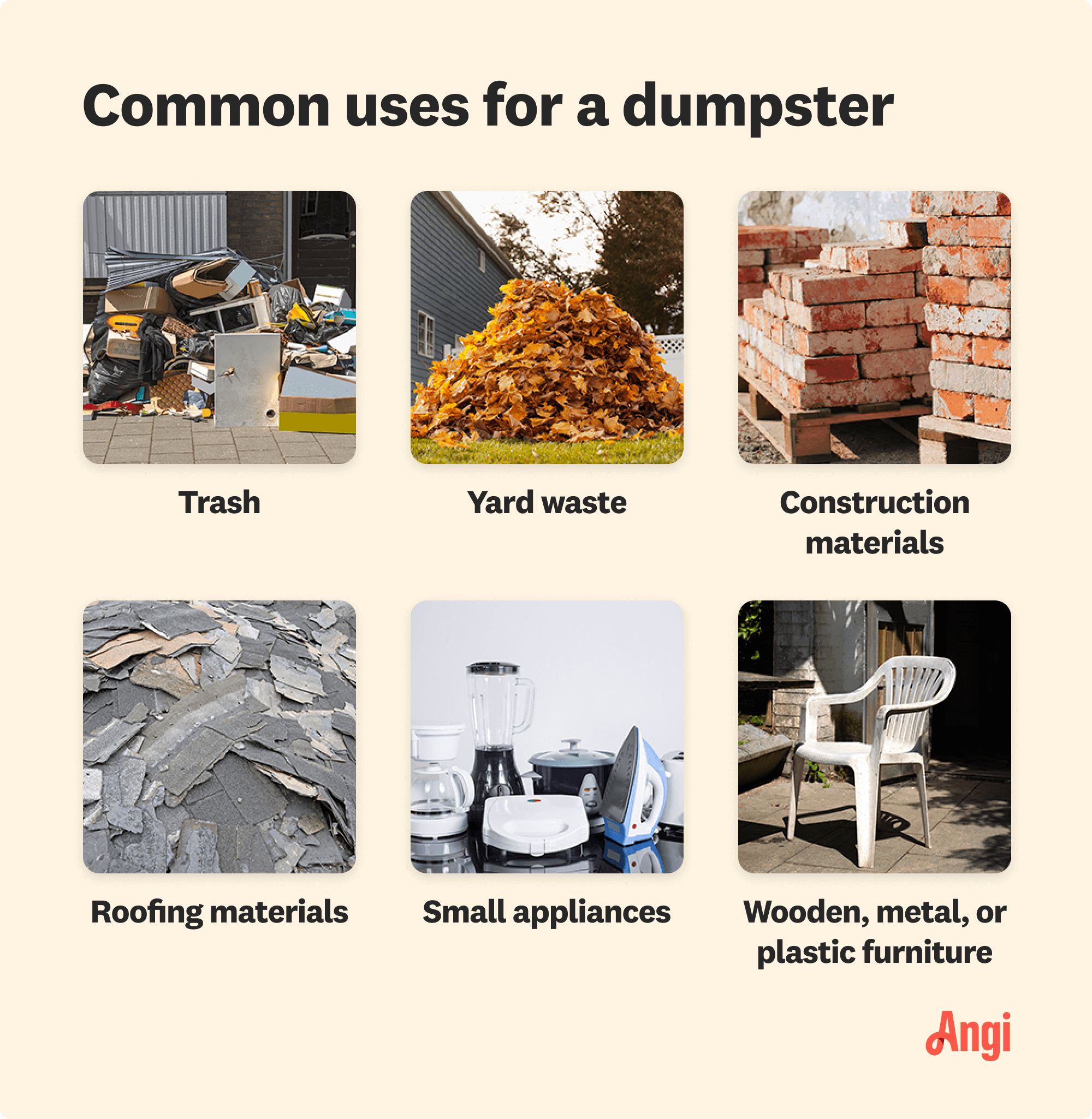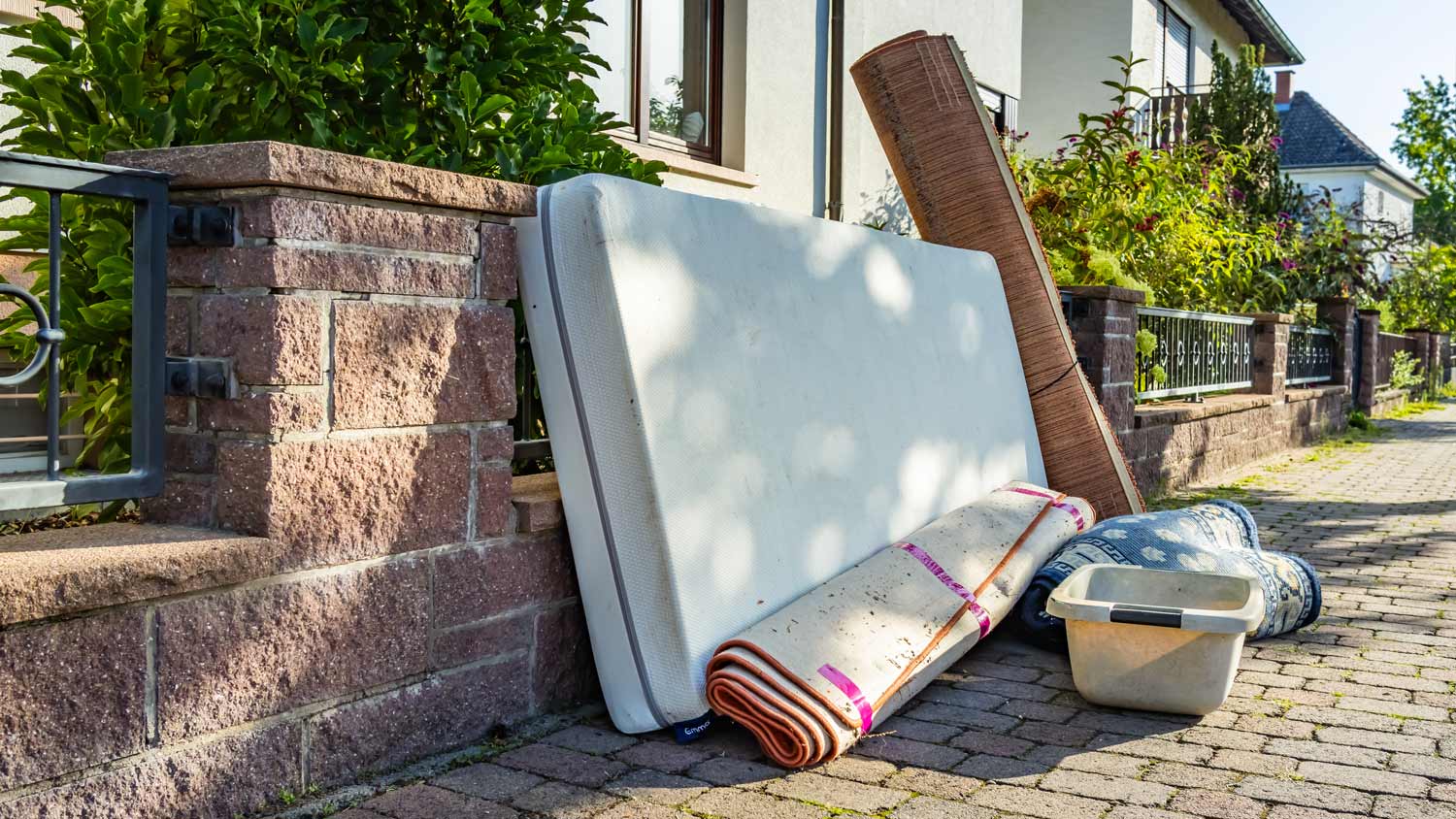
Mattresses are considered hazardous waste, so you’ll likely have to pay disposal fees. Use this guide on mattress removal costs to see what your total will be.
Carpet won’t last forever, but you can give it new life or lessen its environmental impact


Professional carpet removal costs $280 on average, but a pro will effectively remove the carpet and dispose of it.
DIY carpet removal can be physically taxing, may aggravate existing respiratory issues, and requires specialized tools such as a utility knife or pry bar.
This job risks subfloor damage if not done correctly, which can impact future flooring installation.
If you’ve already removed the carpet yourself, a local junk removal company can quickly and easily handle disposal.
If your carpet is worn out and ready for removal, you're probably wondering what to do with it once it's off your floor. You could throw it away, but doing so isn't always easy or environmentally friendly. Luckily, there are many responsible options ranging from recycling to reusing. We’ve rounded up a few methods for how to dispose of carpet in a way you can feel good about.
You don't have to wonder how long carpet lasts—when it reaches the end of its lifespan, you'll see the signs. Old carpet becomes dingy and matted, with shredded fibers, stains, odors, and damaged padding. This usually happens after anywhere from five to 15 years of use.
Old carpeting can be a health hazard, contributing to poor indoor air quality and the spread of allergens. You'll want to have it removed as soon as you can, but you should think carefully about how you'll do so.
The problem with old carpeting is that it doesn't break down easily in a landfill. Despite improvements in carpet manufacturing, most still contain multiple toxic chemicals. On top of that, the Carpet America Recovery Effort (CARE) estimates that about 5 billion pounds of carpet went to landfills in 2017 alone. This carpeting will take hundreds of years to decompose.
Before you can say goodbye to your old carpet, you'll have to remove it from the floor. And while the project is labor-intensive, learning how to remove carpet is quite straightforward and can lower the overall cost of the job. Gather a utility knife, pry bar, hammer, and safety equipment—gloves, goggles, work boots, and dust mask—to start. Utility-sized garbage bags and duct tape to secure the rolls of carpet are also helpful.
After moving furniture out of the way, use a pry bar to delicately pull the edge of the carpet away from the wall or baseboard. Slice the carpet in long, thick strips from one side of the room to the other, peeling and rolling each strip as you go. You may also need to change your utility knife's blade if it dulls.
Lastly, remove the carpet padding in strips using the same method you used for the carpet. If there are still tack strips below the padding, loosen them with your pry bar, being mindful not to damage the floor below.

How you dispose of your old carpet can make a big difference to the environment. Consider the following methods to determine what might work best for your situation.
Carpet recycling can be complex due to the various materials that make up a carpeting system. It’s a bulky combination of nylon, plastic, wool, latex, PVC backing, glue, and other filler materials. However, modern techniques have made recycling of most used carpets possible. Today, manufacturers recycle carpeting to create various new products, including:
Tile backer board
Roofing shingles
Carpet cushions
Stepping stones
Railroad ties
Composite lumber for decking
Car interiors
Industrial flooring
Parking barriers
CARE is a nonprofit organization dedicated to increasing the amount of carpet recycling in the United States. They're a great resource to help find a carpet reclamation location in your area. Otherwise, you can check with local carpet dealers, waste management companies, and government resources to find the best way to recycle carpeting near you.
Call ahead before dropping off the carpet so you know about any requirements they may have.
If your carpet gets removed as part of a new flooring installation, the flooring company you hire may also offer a carpet removal service. On average, carpet removal costs $1 to $5 per square foot, with disposal as an extra fee of $0.40 to $0.50 per square foot.
Many flooring companies have a system in place for safe, efficient carpet disposal. However, if you're concerned about your carpet ending up in a landfill, inquire with the company about where they take the carpets once they're removed. They may agree to transport it to a recycling center of your choice, potentially for another fee.
Large amounts of carpet won’t get picked up as part of your regular waste management service. If your community doesn't have carpet recycling resources or bulk trash pickup services, you can hire a private junk removal service near you. The average cost for a junk removal service to remove carpet is $75 to $150.
These services take all types of household waste and often attempt to find the most environmentally friendly disposal method. Do your research and ask questions to ensure that your carpet won't land in a landfill.
Due to health and safety concerns, donation is more common for pieces of new carpeting leftover from installation. Contact nonprofit organizations focused on home construction and restoration if you have unused carpet remnants. Schools and libraries may also take carpet remnants since they can be cut into small rugs for children to sit on.
However, some organizations will accept pieces of old, used carpet. These include animal shelters, which use old carpets to line the bottoms of dog and cat kennels and cages.

If all else fails and you can't find a way to recycle your old carpet, you can still throw it away, leaving small carpet pieces in the can for regular trash pickup. However, you must plan ahead if you need to throw away a large quantity.
Some waste management companies or community organizations have special collection days or events for bulky items, including old carpeting. If not, you may be able to call your trash service provider to schedule a pickup, which often comes at a fee.
Another disposal option is a dumpster rental. The cost to rent a dumpster large enough for full rolls of carpeting is likely $100 to $300. With at least one other person to help, you can tape up each carpet roll and walk them to the dumpster for pickup. Follow your local community or homeowners association guidelines for dumpster rental.
Depending on the company, dumpsters are often priced based on the cubic yard capacity and/or weight limits, with additional fees for exceeding the limit. To avoid extra charges, homeowners and business owners should be mindful of weight restrictions and avoid overloading the dumpster with heavy materials.
Whether recycling isn't an option in your area or you simply want to find another eco-friendly option for your carpet, upcycling is a great alternative. Upcycling involves creatively using intact carpet for other purposes rather than breaking down each part of the carpet for reuse. Some ideas include:
Using carpet scraps as a kitchen or welcome mat
Sewing together carpet scraps into a new area rug
Rolling out carpet pieces to kneel on while working or gardening
Constructing a cat-scratching post
Placing under the corners of a loud washer or dryer to muffle sounds
Cutting pieces into DIY floor mats for a car
Lining pet crates, cages, kennels, or dog house floors
Placing remnants under vehicles to soak up oil drips
Installing pieces as a weed barrier in a garden
Covering your compost pile to keep it warm in the winter
Waste removal costs an average of $250 when you hire a junk hauling service. Disposing of carpet specifically costs $75 to $150 when you go this route. Another option is to rent a dumpster for $300 to $500 per week. A dumpster is ideal if you have a lot of bulky trash to dispose of, like furniture or construction debris.
If you have some basic DIY skills, you may wish to remove carpet yourself rather than hire a carpet removal service. This can save you anywhere from $1 to $5 per square foot. If you have the means to upcycle or transport the removed carpet to a recycling or disposal facility, you'll also save on disposal and transportation costs. Carpets are heavy, so have a friend help.
From average costs to expert advice, get all the answers you need to get your job done.

Mattresses are considered hazardous waste, so you’ll likely have to pay disposal fees. Use this guide on mattress removal costs to see what your total will be.

Get clear answers on oil tank removal costs, including average prices, key factors, and ways to save. Learn what impacts your project and how to budget.

Need to get rid of paint, solvents, or other chemicals? Use this guide on hazardous waste disposal costs to see what professional removal will cost.

Burning is an efficient way to dispose of yard waste, but it comes with risks. Follow the tips and steps in this guide to learn how to safely burn yard waste.

Scheduling a bulk trash pickup is a simple way to dispose of appliances, debris, and other waste responsibly. This guide covers the basics to help do it right.

There are tons of things you can recycle instead of throwing away, just be sure to follow proper protocol.